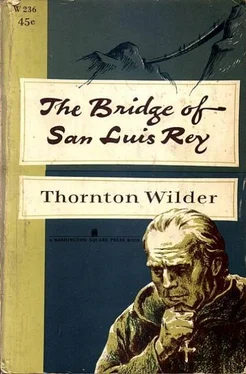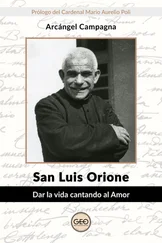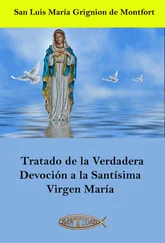It is on this visit to the theatre that further matter hangs. She decided to go to the Comedia where the Perichole was playing Doña Leonor in Moreto’s Trampa Adelante ; perhaps some material could be derived from the visit for her daughter’s next letter. She took with her Pepita, a little girl about whom later we shall learn much. Doña María had borrowed her from the orphanage connected with the Convent of Santa María Rosa de las Rosas to be her companion. The Marquesa sat in her box gazing with flagging attention at the brilliant stage. Between the acts it was the Perichole’s custom to lay aside the courtly role and appear before the curtain to sing a few topical songs. The malicious actress had seen the Marquesa arrive and presently began improvising couplets alluding to her appearance, her avarice, her drunkenness, and even to her daughter’s flight from her. The attention of the house was subtly directed to the old woman and a rising murmur of contempt accompanied the laughter of the audience. But the Marquesa, deeply moved by the first two acts of the comedy, scarcely saw the singer and sat staring before her, thinking about Spain. Camila Perichole became bolder and the air was electric with the hatred and glee of the crowd. At last Pepita plucked the Marquesa’s sleeve and whispered to her that they should go. As they left the box the house arose and burst into a roar of triumph; the Perichole flung herself into a frenzied dance, for she saw the manager at the back of the hall and knew that her salary had been increased. But the Marquesa remained unaware of what had taken place; in fact she was quite pleased, for during the visit she had contrived a few felicitous phrases, phrases (who knows) that might bring a smile to her daughter’s face and might make her murmur: “Really, my mother is charming.”
In due time the report reached the Viceroy’s ears that one of his aristocrats had been openly baited in the theatre. He summoned the Perichole to the Palace and ordered her to call upon the Marquesa and to apologize. The trip was to be made barefoot and in a black dress. Camila argued and fought, but all she gained was a pair of shoes.
The Viceroy had three reasons for insisting. In the first place the singer had taken liberties with his court. Don Andrés had contrived to make exile endurable by building up a ceremonial so complicated that it could be remembered only by a society that had nothing else to think about. He nursed his little aristocracy and its minute distinctions and any insult paid to a Marquesa was an insult to His Person. In the second place, Doña María’s son-in-law was an increasingly important personage in Spain, laden with possibilities of injury to the Viceroy, nay with the possibility of supplanting him. The Conde Vicente d’Abuirre must not be vexed, even through his half-wit mother-in-law. Finally, the Viceroy was delighted to humble the actress. He suspected that she was deceiving him with a matador, perhaps with an actor,—between the flattery of the court and the inertia of gout he could not quite make out who it was; at all events, it was clear that the singer was beginning to forget that he was one of the first men in the world.
The Marquesa, beside not having heard the scurrilous songs, was in other ways unprepared for the actress’s visit. You should know that after the departure of her daughter, Doña María had lighted upon a certain consolation: she had taken to drinking. Everyone drank chicha in Peru and there was no particular disgrace in being found unconscious on a feast day. Doña María had begun to discover that her feverish monologues had a way of keeping her awake all night. Once she took a delicate fluted glassful of chicha on retiring. Oblivion was so sweet that presently she stole larger amounts and tried dissimulating their effects from Pepita; she hinted that she was not well, and represented herself as going into a decline. At last she resigned all pretense. The boats that carried her letter to Spain did not leave oftener than once a month. During the week that preceded the making of the packet she observed a strict regimen and cultivated the city assiduously for material. At last on the eve of the post she wrote the letter, making up the bundle towards dawn and leaving it for Pepita to deliver to the agent. Then as the sun rose she would shut herself up in her room with some flagons and drift through the next few weeks without the burden of consciousness. Finally she would emerge from her happiness and prepare to go into a state of “training” in preparation for the writing of another letter.
Thus on the night following the scandal in the theatre she wrote Letter XXII and retired to bed with a carafe. All next day Pepita moved about the room, glancing anxiously at the figure on the bed. The next afternoon Pepita brought her needlework into the room. The Marquesa lay staring at the ceiling with wide-open eyes, talking to herself. Towards dusk Pepita was called to the door and informed that the Perichole had come to see the mistress. Pepita remembered the theatre very well and sent back word angrily that the mistress refused to see her. The man carried the message to the street door, but returned awestruck with the news that the Señora Perichole was armed with a letter from the Viceroy presenting her to the lady. Pepita tiptoed to the bed and started talking to the Marquesa. The glazed eyes moved to the girl’s face. Pepita shook her gently. With great effort Doña María tried to fix her mind on what was being said to her. Twice she lay back, refusing to seize the meaning, but at last, like a general calling together in a rain and by night the dispersed division of his army she assembled memory and attention and a few other faculties and painfully pressing her hand to her forehead she asked for a bowl of snow. When it was brought her, she long and drowsily pressed handfuls of it against her temples and cheeks; then rising she stood for a long time leaning against the bed and looking at her shoes. At last she raised her head with decision, she called for her fur-trimmed cloak and a veil. She put them on and tottered into her handsomest reception room where the actress stood waiting for her.
Camila had intended to be perfunctory and if possible impudent, but now she was struck for the first time with the dignity of the old woman. The mercer’s daughter could carry herself at times with all the distinction of the Montemayors and when she was drunk she wore the grandeur of Hecuba. For Camila the half-closed eyes had the air of weary authority and she began almost timidly:
“I come, Señora, to make sure that you could not have misunderstood anything I said on the evening that Your Grace did me the honour to visit my theatre.”
“Misunderstood? Misunderstood?” said the Marquesa. “Your Grace might have misunderstood and thought that my words were intended to be disrespectful to Your Grace.”
“To me?”
“Your Grace is not offended at her humble servant? Your Grace is aware that a poor actress in my position may be carried beyond her intentions ... that it is very difficult ... that everything. ...”
“How can I be offended, Señora? All that I can remember is that you gave a beautiful performance. You are a great artist. You should be happy, happy. My handkerchief, Pepita. ...”
The Marquesa brought out these words very rapidly and vaguely, but the Perichole was confounded. A piercing sense of shame filled her. She turned crimson. At last she was able to murmur:
“It was in the songs between the acts of the comedy. I was afraid Your Grace ...”
“Yes, yes. I remember now. I left early. Pepita, we left early, did we not? But, señora, you are good enough to forgive my leaving early, yes, even in the middle of your admirable performance. I forget why we left. Pepita ... oh, some indisposition. ...”
Читать дальше












